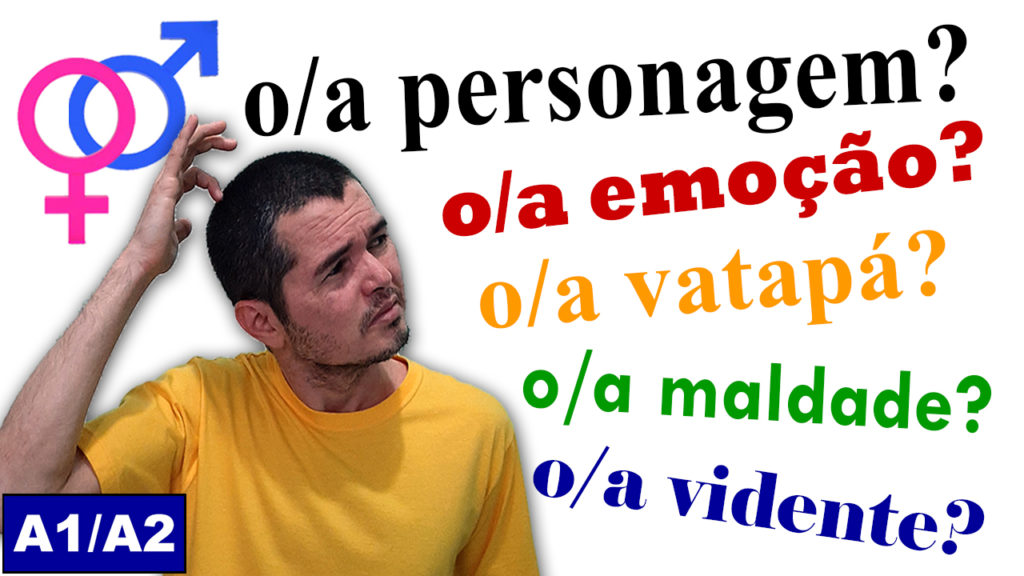Verb conjugation is the most difficult thing to learn in Portuguese.
But, by knowing the right learning tools and strategies, you’ll learn this grammar topic faster than you can imagine.
In this article, I’ll show you step by step how to do that.
- Conjugation and regular verbs
- Irregular verbs
- The most frequent verbs in Portuguese
- How to learn Portuguese verb conjugation easily and quickly
1 – CONJUGATION AND REGULAR VERBS
While English verbs have few inflected forms (e.g. speak, speaks, speaking, spoke, spoken), Portuguese verbs have many more, according to the person (I, you, he, we, they, etc.), tense (present, past, future, etc.) and mood (indicative or subjunctive), Portuguese verb forms consist of a stem and an ending, or inflection.
The pattern of different inflected forms is called conjugation, each class of regular verbs has its own pattern of termination when conjugated.
By classifying verbs into conjugations, it’s easier to remember their many forms. When the verb is regular, all you have to do is to keep the root of the verb and substitute “AR”, “ER” or “IR” for the endings below.
PRESENTE (PRESENT TENSE) – VERBOS REGULARES
| PRIMEIRA
CONJUGAÇÃO (First Conjugation) |
SEGUNDA
CONJUGAÇÃO (Second Conjugation) |
TERCEIRA
CONJUGAÇÃO (Third Conjugation) |
| FALAR (to speak)
Eu fal-o Você fal-a Ele fal-a Nós fal-amos Vocês fal-am Eles fal-am |
BEBER (to drink)
Eu beb-o Você beb-e Ele beb-e Nós beb-emos Vocês beb-em Eles beb-em |
ASSISTIR (to watch)
Eu assist-o Você assist-e Ele assist-e Nós assist-imos Vocês assist-em Eles assist-em |
Examples of other regular verbs: cantar (to sing), amar (to love), comer (to eat), viver (to live), sair (to leave), abrir (to open).
2 – IRREGULAR VERBS
Irregular verbs don’t follow a regular Portuguese verb conjugation. There is no way to tell if a verb is irregular just by looking at its infinitive form, we need to see how it is conjugated. Look these four verbs below:
| TRAZER (to bring)
Eu trago Você traz Ele traz Nós trazemos Vocês trazem Eles trazem |
SER (to do/make)
Eu sou Você é Ele é Nós somos Vocês são Eles são |
COMER (to eat)
Eu com-o Você com-e Ele com-e Nós com-emos Vocês com-em Eles com-em |
BEBER (to drink)
Eu beb-o Você beb-e Ele beb-e Nós beb-emos Vocês beb-em Eles beb-em |
Which ones are irregular? You’re right, trazer and ser! They are irregular because their structures change when they are conjugated.
3 – THE MOST FREQUENT VERBS IN PORTUGUESE
Below I show you the 100 most frequent / common verbs in Portuguese.
Since these verbs are present in most day-to-day life situations, understanding how to use them is a high priority for any Portuguese learner. When you learn them, you accelerate your learning and eliminate information overload.
- abrir – open
- acabar – finish, end
- achar – think, find
- acontecer – happen
- acordar – wake up
- ajudar – help
- andar – walk/ride
- aparecer – appear, show up
- aprender – learn
- arrumar – arrange, tidy up, get
- assistir – watch
- beber – drink
- botar – put, place
- chamar – call, call out
- chegar – arrive
- colocar – put
- começar – start, begin
- comer – eat
- comprar – buy
- conhecer – meet, know
- conseguir – get, manage (irregular)
- contar – count, tell
- conversar – talk
- cozinhar – cook
- dar – give (irregular)
- deixar – leave, allow
- descobrir – discover, find out (irregular)
- descer – go down, descend
- dever – owe, must
- dizer – say (irregular)
- dormir – sleep (irregular)
- encontrar – find
- entender – understand
- entrar – enter
- entregar – deliver
- escrever – write
- escutar – listen
- esperar – wait, hope
- esquecer – forget
- estar – be (irregular)
- existir – exist
- explicar – explain
- falar – speak
- faltar – lack, miss
- fechar – close
- ficar – stay, become (irregular)
- funcionar – work, function
- ganhar – win, earn
- gostar – like
- haver – there to be (irregular)
- ir – go (irregular)
- jogar – play, throw
- lembrar – remember
- levantar – get up
- levar – take/carry
- ligar – call/turn on
- limpar – clean
- mandar – send/order
- morar – reside/live
- mostrar – show
- mudar – change
- olhar – look
- ouvir – hear (irregular)
- pagar – pay
- parar – stop
- parecer – seem
- passar – pass/stop by
- pedir – ask (irregular)
- pegar – take
- pensar – think
- perder – lose
- perguntar – ask
- poder – can/may
- pôr – put (irregular)
- precisar – need
- preocupar – worry
- procurar – search for
- querer – want (irregular)
- receber – receive
- responder – answer
- saber – know (irregular)
- sair – leave (irregular)
- sentar – sit
- sentir – feel (irregular)
- ser – be (irregular)
- subir – go up, climb
- tentar – try, test
- ter – have (irregular)
- terminar – finish
- tirar – remove, take off
- tocar – ring, play, touch
- tomar – take/drink
- trabalhar – work
- trazer – bring (irregular)
- trocar – change, exchange
- usar – use
- ver – see (irregular)
- vir – come (irregular)
- viver – live (irregular)
- voltar – come back
4 – HOW TO LEARN PORTUGUESE VERBS EASILY AND QUICKLY
Why students struggle to memorize verbs
One thing is for sure: there are no shortcuts to learning how to conjugate Portuguese verbs, you need to memorize them. And speaking of memorization, I’d like to talk a little about that before we go to the practical tips.
After you have just learned something, memory retention is 100%. However, it drops rapidly to 42% within just a few days and after that, the decline of memory retention slows down again.
The good news is that, if you repeat or practice something a lot, the information is stored more strongly and the forgetting curve becomes much shallower.
After learning something, our memory of it will decline over time unless we review it. The more we review it, the stronger we make the memory, the longer we can remember it.
When exposed to the same content repeatedly, it takes less time to pull the information from your long-term memory. And here is where most language learners fail: they don’t have the patience to review, they don’t give the brain time to retain what they’ve studied.
Therefore, you’ll only memorize conjugation if you stay in constant contact with verbs, practicing, reading, listening, speaking…
Studies suggest that around 60% of learners are ‘passive’ learners, only 10% are ‘active’ learners, and the remaining 30% are ‘blocked’.
In summary, if you don’t want to struggle with verb conjugation, you need to:
- Be consistent;
- Review;
- Be active.
Going to practice
Now I’ll show you the same strategies my students use in Português Fluente, and I can assure you that they work.
One step at a time, start with the 40 most used verbs in the present:
- ser – be (irregular)
- estar – be (irregular)
- ter – have (irregular)
- fazer – make/do (irregular)
- ir – go (irregular)
- querer – want (irregular)
- poder – can (irregular)
- dar – give
- ficar – stay, get
- dever – must, owe, should
- dizer – say (irregular)
- falar – speak
- achar – think, find
- precisar – need
- saber – know (irregular)
- deixar – let, leave
- colocar – put, place
- passar – pass, exceed
- ver – see (irregular)
- vir – come (irregular)
- conseguir – get, menage (irregular)
- pegar – take, pick up, grab
- botar – put
- sair – leave, go out (irregular)
- gostar – like
- começar – start, begin
- trazer – bring (irregular)
- acabar – end, finish
- levar – take, carry
- terminar – end, finish
- conhecer – know, meet, get to know
- ouvir – hear
- entender – understand
- chegar – arrive, be enough
- pedir – ask, order (irregular)
- perguntar – ask a question
- encontrar – find, discover
- tentar – try
- pôr – put (irregular)
- haver – there to be, exist (irregular)
STEP 1 – Create your own table conjugation in your notebook. And if you pay close attention, It’s only necessary to memorize the conjugation of four people: eu, você, nós, eles.
| PRIMEIRA
CONJUGAÇÃO |
SEGUNDA
CONJUGAÇÃO |
TERCEIRA
CONJUGAÇÃO |
| FALAR (to speak)
Eu fal-o Você fal-a Ele fal-a Nós fal-amos Vocês fal-am Eles fal-am |
BEBER (to drink)
Eu beb-o Você beb-e Ele beb-e Nós beb-emos Vocês beb-em Eles beb-em |
ASSISTIR (to watch)
Eu assist-o Você assist-e Ele assist-e Nós assist-imos Vocês assist-em Eles assist-em |
STEP 2 – Create flashcards on Quizlet, a free website and app providing learning tools for students. Besides flashcards, Quizlet also has game modes, making your learning experience more pleasant and effective.
When creating your flashcards, you need to take 2 things into consideration:
- Instead of writing isolated verbs, make short sentences. Example: Eu bebo água, você bebe vinho, nós bebemos cerveja, eles bebem cachaça;
- Make sure these phrases are correct and they are actually used in the context you’ll use them (ask a teacher or a native speaker to check them).
Study these verbs everyday, and when you master them in the present, follow the same steps above with verbs in the past. Use this website to check all Portuguese conjugations.
You won’t become fluent just by memorizing verb conjugation, that’s just the tip of the iceberg. You need to have good listening, good pronunciation, wide vocabulary, conversation practice etc.
So, if you want to learn Portuguese for real, enroll in my complete course for beginners.
Até breve!







